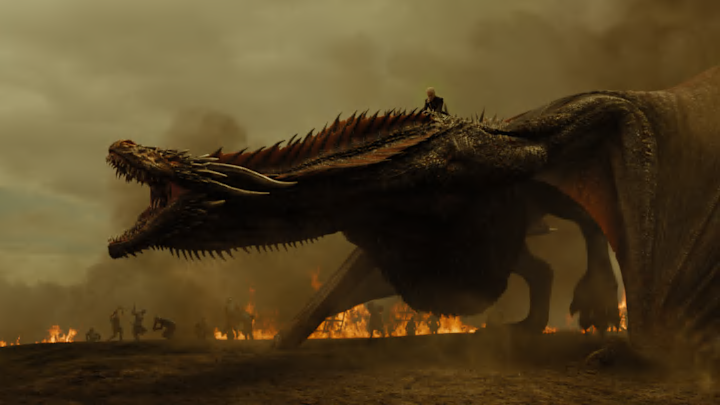The other month, author George R.R. Martin criticized how both Game of Thrones and House of the Dragon depicted dragons on their heraldry. To wit: some sigils on both shows depict dragons as having four legs. But in his Song of Ice and Fire books as well as in his book Fire & Blood, Martin is clear that dragon sigils only ever have two legs. "Someone got sloppy, I guess," Martin wrote. "Or someone opened a book on heraldry, and read just enough of it to muck it all up. A little knowledge is a dangerous thing."
This is a small quibble, but Martin feels passionate about it. It's part of his bigger goal of writing a fantasy series that nonetheless feels grounded in reality. "One thing that I've gotten a little bit of controversy in lately is my insistence that dragons only have two legs," he said during a talk at the Oxford Writers House. "These four-legged dragons are a creation of medieval heralds who had never seen a dragon, because they don't exist. And they decide dragons have four legs and wyverns only have two legs, and people constantly correct me on that, and of course they're wrong."
"The point is, in Westeros, we do have dragons. So why would anyone put a four-legged dragon on a shield? You just have to go out and see the real dragon and count, like, 'One. Two.' That's all you need. Plus the wings. And I checked with Neil deGrasse Tyson...and got, 'yes, there are no six-limbed animals on the face of the Earth.' So I went for the more realistic thing."
Neil deGrasse Tyson is an astrophysicist and popular commentator on all things science; I don't know whether Martin is joking about seeking him out, but I'm putting him down as a two-legged dragon truther.

How does George R.R. Martin approach magic?
Martin bundled in his talk about dragons into a wider discussion about magic in fantasy novels, noting that there are a lot of fantasy authors who take a ton of time carefully working out their magic systems; folks like Brandon Sanderson and Patrick Rothfuss come to mind. On the other hand, the magic in Martin's books is much more vague and mysterious, which is how he likes it.
"It seems to me, that if you have a magical system, you don't have magic, you have fake science...What passes for magic in the real world is unpredictable...Magic should be dangerous, it should be unpredictable, it should be something we don't understand that's not just fake science. Or at least that's the way I handle it. But it does slow me down a little thinking about all of these particular things."
He's also got thoughts about prophecy, something House of the Dragon in particular has gone hard on. "[M]agic, like prophecy, should be a little unpredictable," Martin said. "You can't have a prophecy that just comes true the way it's written and everybody understands it. It has to come true in some way you didn't understand so it bites you on the ass. That's the way we see prophecy in real history, in real life."
Martin tells a story about a man who lived during the real-life War of the Roses who was told he could never go to a certain castle or he would die. So he avoided the castle his whole life only to die outside a bar that had an image of the castle on its sign. "That's what you want, that kind of twisting, but it doesn't always come easy."
Keeping magic strange and impenetrable definitely adds a layer to Martin's books that I don't find in the works of someone like Sanderson or Rothfuss; don't get me wrong, I enjoy their work, but I agree with Martin that those kinds of magic systems are less magic and more fake science, which isn't as interesting to me. It does make things hard to write, though; Martin says that the most difficult character for him to write in the Song of Ice and Fire books is Bran Stark, both because he's a young boy and that's outside Martin's usual perspective, and because his story is the one most closely associated with the magic of the world. "All I can say is it's something that requires a lot of thought," Martin said.
As for the easiest character for Martin to write, it's Tyrion Lannister, who is a bit of a "smartass." I think the ease shows. Now if only Martin would finish writing the next book in his series, The Winds of Winter, so we could catch up with Tyrion and the rest of the cast. But that's a whole different story:
To stay up to date on everything fantasy, science fiction, and WiC, follow our all-encompassing Facebook page and Twitter account, sign up for our exclusive newsletter and check out our YouTube channel.
